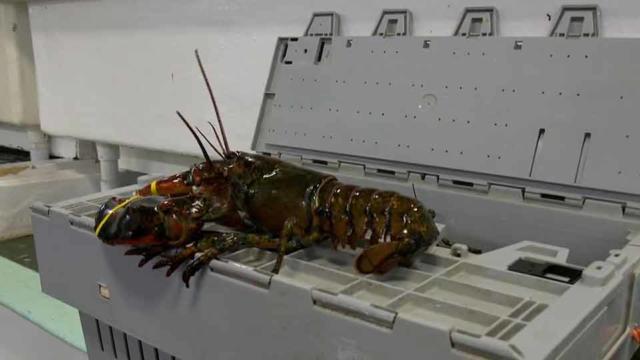The U.S. state of Maine is feeling the effects of the trade war between Beijing and Washington. In the crossfire are lobsters and a $1.5 billion industry centered on what China considers a delicacy.
CGTN’s Frances Kuo travelled to Maine to get a closer look at the impact.
The pride of Maine is on full display along its kilometers of postcard-perfect coastline.
But, lobster is the state’s real bread and butter.
Captain Bill Linnell runs Cap’n Bill’s Lobster in the heart of Portland, the largest city in Maine. Lobster is in his blood.
“I’ve been making lobster rolls for about 50 years,” said Linnell. “My lobster’s so sweet, you could put it in your coffee!”
Linnell is part of the state’s mammoth lobster industry, estimated at more than $1.5 billion.
“We’ve been doing this since the 1600s, so it’s a big part of Maine and who we are,” said Matt Jacobson, Executive Director of the Maine Lobster Marketing Collaborative.
But now that China has imposed a 25 percent retaliatory tariff on U.S. lobsters, during peak season, there’s plenty of concern.
“That’s a hand grenade in our business, when something happens that quickly, that devastating,” said Michael Marceau of the Lobster Company. It’s a wholesale distributor that weighs, packs and ships lobsters in the U.S. and abroad.
More than two million kilograms (4.4 million pounds) a year is processed through the facility. About half of that is shipped to China to cities including Hong Kong, Shanghai, Shenzhen and Beijing.
Twelve years ago, Hong Kong imported more than 130,000 kilograms (over 286,000 pounds) a year; now it takes in six or seven million (over 13 million pounds).
Marceau worries the tariffs may force him to downsize.
“Most of our employees have been with us a long time, we don’t want to see them go anywhere,” said Marceau.
“Five years ago, we didn’t do anything in China, and last year, we did about 15-20 million pounds,” said Jacobson.
Jacobson believes Maine lobsters are popular in China, because they’re so fresh, plucked out of the cold, clean waters with strict standards on sustainability.
“China especially likes that story, especially because they’ve had issues of food security,” said Jacobson.
Captain Dave Laliberte is one of Maine’s 4,800 commercial lobstermen.
He’s been in in the industry for 15 years.
“I like the unknown of what’s going to be in the trap,” said Laliberte.
Now, with the tariffs, he has to navigate more troubled waters.
“I think without a doubt, it creates uncertainty,” said Laliberte. “You’ve already got to be worried about the price of bait, the price of fuel, what your catch will be worth when you get back to the dock.”
But, those in the lobster industry are known for their resilience.
“It’s a hearty bunch, you’ve got to be out early in the morning in all sorts of conditions,” explained Laliberte.
For now, all he and others in the industry can do is ride it out and hope what’s put Maine firmly on the map will still have them hooked.
“When somebody’s eating a lobster, that’s a treat. That’s something special,” said Laliberte.
CGTN’s Frances Kuo tries her hand at being a lobster fisherman, from preparing the bait to securing the claws.
 CGTN America
CGTN America

